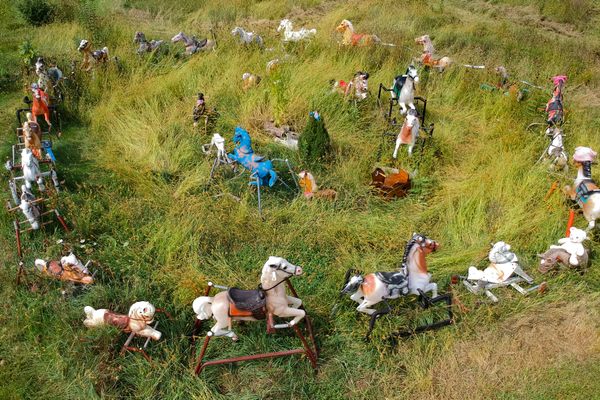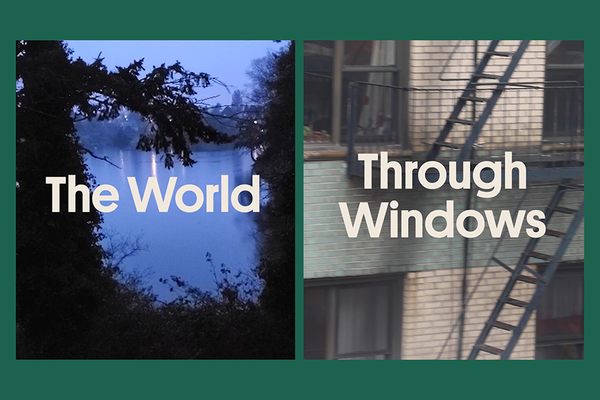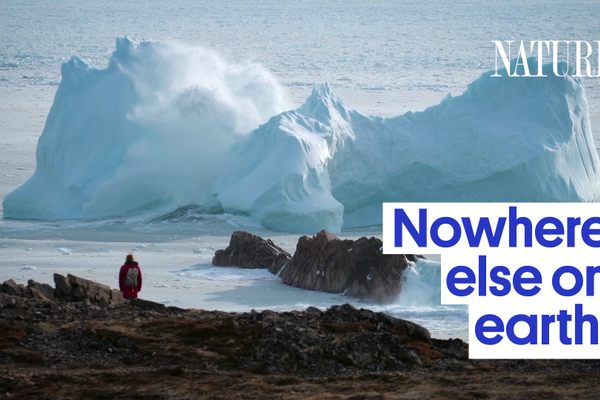My First Journey: Atlas Obscura Co-Founder Josh Foer’s Great American Road Trip
“The most important experience of my life in terms of shaping who I am.”

To celebrate our 10th anniversary, Atlas Obscura is launching First Journey, a chance for one of our readers to win $15,000 toward a meaningful, once-in-a-lifetime experience. The competition is inspired by our co-founders, Dylan Thuras and Josh Foer, who both went on transformative journeys in their early adult years.
Though Josh and Dylan’s trips were very different, their approaches were the same: a clear mission, unrestricted time to explore, and deep, purposeful examination of a place and its cultures. Without these experiences, there would not be an Atlas Obscura. Below, I chat with Josh about his own First Journey, and you can also read my interview with Dylan about his First Journey.
Josh, we’ve been talking a lot about what constitutes a journey, and why the experience of taking one is fundamentally different than other kinds of travel. In your mind, what’s the first real journey that you took?
So when I was 19 years old, I was staring down a two-month summer vacation from college. I ended up getting my hands on a beat-up old minivan, and decided to drive all over the country for seven weeks. And I set myself this goal of trying to have an adventure of some kind every day, and then writing about it.
At that point in my life, I’d been to California once or twice, been all over the East Coast, but I didn’t really know the country in between. So, my goal was to really see America. And that was the frame for the journey. It was the first great journey of my life and it was the most important experience of my life in terms of shaping who I am. Certainly, in terms of shaping the ideas that would become Atlas Obscura, that trip was absolutely seminal.
Did you have a friend with you, or were you doing this by yourself?
I had a friend with me for the first three weeks of the trip, and then the last four weeks I was traveling by myself.

How did you go about executing on this goal to try to have an adventure every single day?
I spent a lot of time preparing. Plotting out places that I wanted to see, or experiences, or where I thought I’d be able to get myself into some useful trouble. So, for example, I started with a map of the United States and imagined that I was going to spend the first half of the trip just in the South, and I said okay: I want to go to Bob Jones University, the flagship evangelical college, where I hoped I’d encounter people who really looked at the world differently than I did. At that point in time, I think they had just eliminated their ban on interracial dating. And so, I wrote them a letter and said, “Hey! I’m interested in transferring to Bob Jones, do you think that I could get a tour of the campus?”
Really?
And they said, “of course!” In fact, they really rolled out the red carpet for me. I spent a day and a half on the Bob Jones campus, really getting a sense of how the students thought and how the faculty thought, and what this place was like. And then I went to a roadside motel the next evening, and wrote about that experience.
I also knew that I really wanted to make it to the National Hollerin’ Contest in Spivey’s Corner, North Carolina. It’s a competition—I actually didn’t know this at the time, I subsequently learned it—where you compete in practicing this ancient form of communication that was used in the lowlands of North Carolina to communicate between farms and send messages. And that yodel was being kept alive in the form of this competition. I knew I wanted to see that. I entered the contest, and that was another one of my experiences.
The real thing that shaped the whole experience for me was having a mindset that, every day, my job is to find an adventure. So I also left myself a wide amount of room. If I saw a sign on the side of the road for a gun show in western Colorado, I would pull over and decide, “all right, today, I go to a gun show.” And then I would go to a gun show. Then I would find out that there was a shooting club that used only 19th-century weaponry. “Oh, they’re meeting tomorrow? Okay, I’m going to go to that.”
By letting my curiosity lead the way, and giving myself a lot of leeway in terms of time and freedom, I think what I developed over the course of that summer was a good nose for interesting experiences. I realized that I loved that chase, and I loved telling people the stories that came out of that chase, and that was the summer that realized that I wanted to become a journalist.
Not to get too far on a tangent, but I have to ask you about the night you spent at Bob Jones University. What was that like?
It got a little bit frightening when the RA in the dorm started to wonder why this very Jewish-looking kid from New England was asking all these questions, like what people really thought about the pope. He took me aside and sat me down and sort of started interrogating me about what church I went to, and my family’s religious beliefs. I was able to fake my way through that, but when I woke up at six a.m. the next morning, my bunkmate was already hard at work at bible study, and I decided I was going to jet. I shot out the door and I was happy to get away from that place as fast as possible.
Did you tell them you were Jewish?
Heck no!

So when you were writing about your experiences on this trip, were you doing it for an audience? Were you posting it online, or did you have a notion of what you wanted to do with this writing?
Yes, so I had what at that time, what I believe was still called a weblog.
Indeed.
I don’t think they were calling them blogs yet. And I was posting these things mostly for family and a few friends, I don’t even think it was a public URL. Really, it was an exercise for me and a means of developing self discipline. To observe, experience, and share, and to do it on a very tight timeframe. Because when you’re driving around the country, you’re having your experiences and then you have to go crank something out at night. It was a real exercise in writing on a deadline.
Did you find it challenging to set aside the time to do that writing every night?
Yeah, and also the other piece of this was—I was doing this on a 19-year-old’s budget, which meant that we weren’t staying in nice hotels. In fact, often not staying in a hotel at all. The whole point of having a minivan was that it’s possible to sleep in the back. Or in a tent. I think I stayed in a $19-a-night motel room a couple times. I don’t even think you can find those anymore.
And that’s an important variable not to forget. This was in 2002. Gas was like $1 a gallon. This trip would cost three times as much to do it today. That was a moment when it was very easy to really explore on the road without breaking the bank.
What about how you framed this journey for yourself, and the goals that you set for it, made it different from other trips that you’d taken before?
One of the things I did in preparation for this trip is read all of the great American road trip literature. You know, Steinbeck, Kerouac. It’s a very American idea, that one discovers not just the country but oneself on the road, and I believed in that romantic notion at 19.
I also understood that this trip was part of my becoming a grown-up human being, and that I needed to challenge myself and put myself into uncomfortable positions for the sake of growing up. To this day, I can’t drive with the windows down without picturing myself with a cigarette dangling from my mouth on the open road in Utah, remembering how free and alive and full of potential I felt on that trip. In a way, the rest of my life since then has been trying to recover some of the things that I felt and experienced on that journey. And Atlas Obscura is, as an enterprise… part of the reason that I wanted to create this thing, originally, was to help give other people a taste of what I had experienced on that journey.

You’ve already told me a couple, but is there a particular adventure that you had on the trip that you always tell people about?
I remember I ended up in New Orleans, just walking around, and ended up getting sucked into a conference for a pyramid scheme. I was inside this annual convention for a bunch of pyramid schemers, and ended up trying to figure out how these people operate, how they understood what they were doing.
I went to a Hare Krishna commune in, I think it was Mississippi, which is an interesting place to be a Hare Krishna. I went to a UFO convention, and ended up befriending and really spending a lot of time with this true believer in UFOs. And I remember in Denver, I went to this day laborer center and tried to get myself hired for the day.
Did you?
Not successfully! But I got to spend a lot of time with day laborers and find out what their lives were like. In Chicago, I went to a goth night at a club and spent the evening with all these goths.
I wanted to know as much and experience as much of what there was, the diversity of this country as I possibly could, in the short time that I had. So, it took me down some very unlikely, strange alleys.
I should probably point out, knowing you, that I find it fun to picture you at a goth night. But plenty of people our age had a goth phase, I don’t know if you—
I definitely did not have a goth phase. [Laughing]

As you think about this competition Atlas Obscura is launching, First Journey, what comes up for you? Why do you think it’s important for more people to have the opportunity to take a meaningful journey like the one that you took?
A really great journey, like the one I had when I was 19, it was as much about finding myself as it was about finding other people or other places. And that was a really unique opportunity that I had that I wish everyone could have. But doing something like that requires—there’s a financial component to it, it is expensive to travel. And it is expensive in time to travel, not everybody can find the time.
But there’s something else that I think we can give people that is also a difficult thing to come by. And that is the permission to go. I was very fortunate that my parents were like, “great! That sounds like a wonderful idea. You should go do that.” I want Atlas Obscura to give people the permission to go and have an incredible experience. To find, and discover, and to know that not only is it a good thing, that it’s something they should embrace.
Right, if you never did this, and you’re realizing it’s something you regret, how do you give yourself that permission? It’s not an easy thing.
Well, I think part of the permission comes from the mission. Why am I doing this? Why am I going to spend time and money and not do something else in order to have this set of experiences that I hope to have? One of the things that hopefully we’ll do with this contest is help people define for themselves what that mission is, that gives them the permission to go and take this journey.
You know, I can’t believe I didn’t remember this sooner, but I actually got a grant from my college to take that road trip. I got a $1,000 travel grant.
Wait, really? So that was part of it, you got $1,000.
Yes, somebody made it possible for me. And it wasn’t the $1,000—$1,000 wasn’t the thing separating me from doing this. It was having the blessing of somebody else, you know?
You could have done it without the thousand bucks but—
But I couldn’t have done it without the sanction. It would have been much nicer to have the—
The $15,000 we’re offering with First Journey.
Yeah, maybe I wouldn’t have had to sleep in the back of the minivan.
Win $15,000 for your First Journey. Enter now.











Follow us on Twitter to get the latest on the world's hidden wonders.
Like us on Facebook to get the latest on the world's hidden wonders.
Follow us on Twitter Like us on Facebook